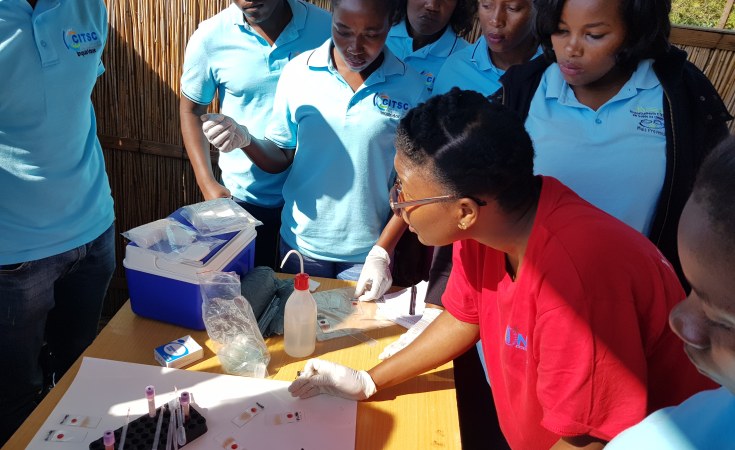Globally there are more than 5.1 million cases of COVID-19 with most cases currently in high income countries. The U.S. and Europe are responsible for 72% of COVID-19 cases, 63% of recoveries and 82% of deaths. In contrast, World Health organization estimates there were 228 million cases of malaria and 405,000 deaths due to malaria worldwide in 2018. Africa bore the burden of these statistics, accounting for 93% of malaria cases and 94% of malaria deaths.
As African countries ramp up testing capacity, COVID-19 statistics will no doubt increase. Recently, the WHO cautioned that Africa may soon become the new epicenter of COVID-19. If this happens, Africa would suffer a double burden of killer diseases due malaria and COVID-19.
These infectious diseases have similar symptoms such as headache, fever and body ache, which can be confusing for community members and health workers. This should be a source of concern to the global health community because of likelihood of delayed diagnoses, misdiagnoses and deaths from both diseases.
High income countries are stocking up on ventilators and other intensive care unit equipment to combat COVID-19. However, in Africa, what may be most important to do is efficiently managing the link between malaria and COVID-19 to ensure lives are not lost needlessly.
African governments must focus on opportunities within the informal health sector in addition to working towards universal health coverage for all as a way to combat malaria. These are four ways to achieve that.
First, leverage wide availability and patronage of Patent Proprietary Medicine Vendors (PPMVs) in Africa to scale up malaria prevention and treatment. PPMVs include chemists and community pharmacies that are highly patronized by community members. In Nigeria, about $2.1 billion of the total health expenditure is spent on treatment at PPMVs. This amount is twice the total value of international donor support to Nigeria. Community members trust these outlets and they provide a good opportunity to take malaria interventions to scale. There is a lesson to learn from Nigeria-based health-tech firm, WellaHealth, which provides prepayment plans for malaria treatment and referral services through a network of PPMVs across Nigeria. For a monthly fee of $1.20 (450 naira), clients can benefit from a package of services. The services include, rapid malaria tests; malaria treatment; chat with a doctor anytime, $256 (100,000 naira) in cash when admitted to a hospital and $205 (80,000 naira) in cash for accidental death.
Second, use community health workers to improve malaria preventive services because high percentages of Africans live in rural areas where accessing hospitals is challenging. Rural population varies by country but are often high- Burundi (86.97%), Niger (83.58%), Nigeria (49.66%), Rwanda (82.79%) and South Africa (33.65%). Rwanda is already improving malaria services through a network of 45,000 community health workers. Data shows that 57% of malaria cases in Rwanda are treated by community health workers. These individuals are elected by their villages and trained by health workers. Services community health workers render include distribution of LLINs, use of rapid diagnostic tests for diagnoses of malaria, use of artemisinin-combination drugs for treatment of uncomplicated malaria, referral of complicated malaria cases to district hospitals and leading environmental sanitation in villages. In 2019, I was at the University of Global health Equity at Butaro in Rwanda and saw firsthand the work of community health workers and the impact they make to reduce the incidence of malaria.
Third, use existing polio structures to scale up malaria diagnoses and treatment. The world is at the final stages of polio eradication and thankfully the global polio eradication initiative has created a network of Disease Surveillance and Notification Officers (DSNOs) at local councils. These DSNOs are well trained and lead collection of samples for polio diagnoses. Their functions should be expanded to include malaria diagnoses and treatment using RDTs and artemisinin combination therapies respectively.
Fourth, integrate malaria elimination as part of One Health approach for epidemic preparedness. One Health encompasses the interaction of human, animal and environmental health to increase incidence of infectious diseases. The state of the environment has huge impact on malaria transmission. For instance, research in Cameroon showed that people who lived in houses surrounded by bushes, garbage heaps, swamps or stagnant water showed higher malaria parasite prevalence and densities compared with those from cleaner surroundings.
Malaria interventions such as use of Long-Lasting Insecticide-treated Nets (LLINs), use of vector control to mitigate the action of malaria parasites, intermittent preventive treatment in pregnant women and use of Artemisinin-combination drugs for treatment should be included in the One Health efforts.
The global health community must ensure scarce resources are efficiently deployed to scale proven malaria interventions. Africa is not ready to deal with yet another double burden of disease.
Dr. Ifeanyi M. Nsofor, MBBS, MCommH (Liverpool) is a Senior New Voices Fellow at the Aspen Institute, a Senior Atlantic Fellow for Health Equity at George Washington University and a 2006 Ford Foundation International Fellow


